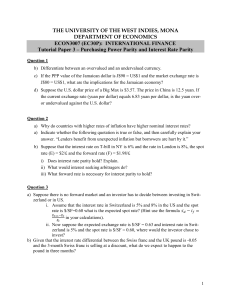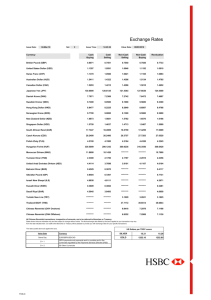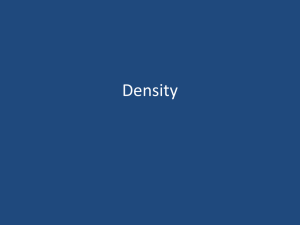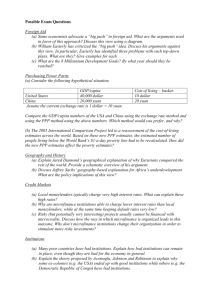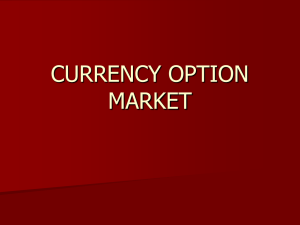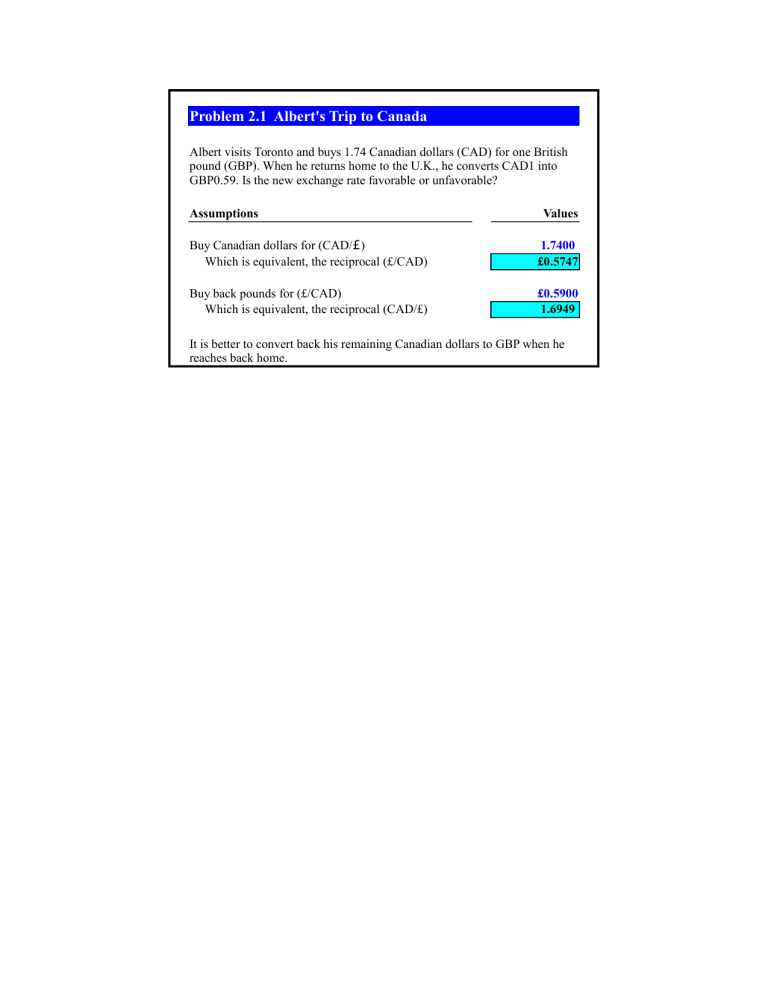
Problem 2.1 Albert's Trip to Canada Albert visits Toronto and buys 1.74 Canadian dollars (CAD) for one British pound (GBP). When he returns home to the U.K., he converts CAD1 into GBP0.59. Is the new exchange rate favorable or unfavorable? Assumptions Values Buy Canadian dollars for (CAD/£) Which is equivalent, the reciprocal (£/CAD) 1.7400 £0.5747 Buy back pounds for (£/CAD) Which is equivalent, the reciprocal (CAD/£) £0.5900 1.6949 It is better to convert back his remaining Canadian dollars to GBP when he reaches back home. Problem 2.2 Lottery Winner Aisha lives in Melbourne, Australia. She wins €150 in an online lottery on Thursday and wishes to convert the amount into Australian dollars (AUD). If the exchange rate is 0.5988 euros per AUD, how many AUDs does she get, and what is the value date of the AUD payment? Assumptions Cross rate (euros/AUD) Prize amount in euros What is the amount in AUD? (the euro amount divided by the cross exchange rate) Values 0.5988 150.00 AUD 250.50 Cross exchange rate transactions are settled in two business days, so in this case, Monday. Problem 2.3 Gilded Question In 1923, one ounce of gold cost 380 French francs (FRF). If, at the same time one ounce of gold could be purchased in Britain for GBP4.50, what was the exchange rate between the French franc and the British pound? Assumptions Price of an ounce of gold in French frans (FRF/oz) Price of an ounce of gold in Sterling Pounds (GBP/oz) What is the implied GBP/FRF rate? (GBP price of an ounce / FRF price of an ounce) …. Or if expressed as FRF/GBP Values FRF 380.00 4.50 0.01 FRF 84.4444 Problem 2.4 Brent Oil In 2015 one barrel of Brent oil traded for GBP 42.5 and South Africa rands (ZAR) 790. What is the exchange rate between the pound and the rand? How would the exchange rate change if the oil price jumps to GBP 50/barrel (assume no change in the price in S. Africa)? Assumptions Price of an ounce of gold in GBP (£/barrel) Price of an ounce of gold in S. African rands (ZAR/barrel) What is the implied ₤/ZAR exchange rate? (GBP price of an ounce / ZAR price of an ounce) Brent Oil Values £42.50 ZAR 790.00 What If £50.00 ZAR 790.00 £0.0538 £0.0633 Problem 2.5 Toyota Exports to the United Kingdom Toyota manufactures most of the vehicles it sells in the United Kingdom in Japan. The base platform for the Toyota Tundra truck line is ¥1,650,000. The spot rate of the Japanese yen against the British pound has recently moved from ¥197/£ to ¥190/£. How does this change the price of the Tundra to Toyota's British subsidiary in British pounds? Assumptions Original spot rate, Japanese yen/British pound New spot rate, Japanese yen/British pound Export price of Toyota Tunda truck, Japanese yen Original Import Price in British pounds Values 197.00 190.00 1,650,000 8,375.63 Export price in yen / Original spot rate in yen/pound New Import Price in British pounds 8,684.21 Export price in yen / New spot rate in yen/pound Percentage change in the price of the imported truck 3.68% New price / Old price - 1 Because the price of the truck itself did not change, the percentage change in the import price as expressed in British pounds is the same percentage change in the value of the Japanese yen against the British pound itself. Problem 2.6 Online Shopping Tamara lives in Egypt and has placed a bundle of items in her Amazon.co.uk account basket. She has the choice to pay in Egyptian pounds (EGP 1844) or in GBP (151.17). What is the exchange rate between both currencies? In which currency should she pay? Assumptions Egyptian pound price of basket (EGP) British pound price of basket (GBP) Values 1,844.00 151.17 Implied exchange rate (EGP/£) 12.1982 Many emerging markets that suffer from foreign exchange shortages have more than one exchange rate . The official exchange rate is the one officially transacted by the banking system. However, there is usually a parallel foreign exchange market where the foreign currency is usually cheaper. Tamara should weigh both of these rates before making her decision. Problem 2.7 Israeli Shekel Changes Value One British Pound (GBP) traded against Israeli Shekels (ILS) 5.82 in 2013, but the exchange rate rose to 6.78 in late 2014. What is the percentage change of the ILS? Has the shekel depreciated or appreciated? Calculation of Percentage Change in Value Initial exchange rate (ILS/£) New exchange rate (ILS/£) Percentage change in shekel value (ending rate - beginning rate) / (beginning rate) As the exchange rate rises, the British pound is able to buy more shekels. Thus, the shekel has depreciated by 16.49%. Values 5.82 6.78 16.49% Problem 2.8 Hong Kong Dollar and the Chinese Yuan The Hong Kong dollar has long been pegged to the U.S. dollar at HK$7.80/$. When the Chinese yuan was revalued in July 2005 against the U.S. dollar from Yuan8.28/$ to Yuan8.11/$, how did the value of the Hong Kong dollar change against the yuan? Assumptions Original Chinese yuan peg to the dollar, yuan/$ Revalued Chinese yuan to the dollar, yuan/$ Hong Kong dollar peg to the US dollar, HK$/$ Values 8.28 8.11 7.80 Original HK$/Yuan cross rate HK$/Yuan = (HK$/$) x ($/Yuan) 0.9420 New HK$/Yuan cross rate HK$/Yuan = (HK$/$) x ($/Yuan) 0.9618 As a result of the revaluation of the Chinese yuan, the Hong Kong dollar has fallen in value against the Chinese yuan. Problem 2.9 Chinese Yuan Revaluation Many experts believe that the Chinese currency should not only be revalued against the U.S. dollar as it was in July 2005, but also be revalued by 20% or 30%. What would be the new exchange rate value if the yuan was revalued an additional 20% or 30% from its initial post-revaluation rate of Yuan 8.11/$? Calculation of Percentage Change in Value Initial exchange rate, post official revaluation (Yuan/$) Percentage revaluation against the US dollar Revalued exchange rate (Yuan/$) Values 8.11 20.00% 6.76 Initial exchange rate, post official revaluation (Yuan/$) Percentage revaluation against the US dollar Revalued exchange rate (Yuan/$) 8.11 30.00% 6.24 As painfully obvious, it is clear why so many critics of the Chinese yuan policy were not particularly happy with the revaluation of only 2.1%. Problem 2.10 TEXPAK (Pakistan) in the UK TEXPAK is a Pakistani-based textile firm that is facing increasing competition from other manufacturers in emerging markets selling in Europe. All garments are produced in Pakistan, with costs and pricing initially stated in Pakistani rupees (PKR), but converted to British pounds (GBP) for distribution and sale in the United Kingdom. In 2014, one suit was priced at PKR 11,000 with a British pound price set at GBP95. In 2015, the GBP appreciated in value versus the PKR, averaging PKR120/GBP. In order to preserve the GBP price and product profit margin in rupees, what should the new rupee price be set at? Assumptions Original (2014) unit price, rupees (PKR) Original (2014) British pound price for sale and distribution Average spot rate for 2015, rupees per pound Values 11,000.00 95.00 120.00 First, the implied spot exchange rate for the previous year, 2014 must be found by dividing the PKR price by the GBP price selected for distribution and sale. Implied original spot rate, PKR/GBP 115.79 Assuming that TEXPAK wishes to preserve the British price for competitiveness, the same Britsh pound price must be converted back into Pakistani rupees with the new spot exchange rate in rupees per GBP: Recalcualted Pakistani rupee price of product (Original GBP price x Avg spot rate for 2015) 11,400.00 Because the Pakistani rupee depreciated in value against the GBP, the implied PKR price is actually HIGHER than it was the previous year. This means that TEXPAK would keep the same British pound price and either enjoy a much larger profit margin in PKR, or potentially keep the PKR price the same as the previous year and actually reduce the GBP price. Problem 2.11 Vietnamese Coffee Coyote Many people were surprised when Vietnam became the second largest coffee producing country in the world in recent years, second only to Brazil. The Vietnamese dong, VND or d, is managed against the U.S. dollar but is not widely traded. If you were a traveling coffee buyer for the wholeale market (a "coyote" by industry terminology), which of the following currency rates and exchange commission fees would be in your best interest if traveling to Vietnam on a buying trip? Currency Exchange Vietnamese bank rate Saigon Airport exchange bureau rate Hotel exchange bureau rate Assuming an intial cash amount for exchange to dong of: Assumptions Vietnamese bank rate (dong/$) Bank commission (%) Saigon Airport Exchange Bureau rate (dong/$) Airport comission (%) Hotel Exchange Bureau rate (dong/$) Hotel comission (%) Rate d19,800 d19,500 d19,400 Commission 2.50% 2.00% 1.50% $10,000.00 Values 19,800 2.50% 19,500 2.00% 19,425 1.50% Vietnamese dong proceeds 193,050,000 191,100,000 191,336,250 The combined exchange rate and commission offered in the commercial banks in Vietnam is the better rate. In the case of the Hotel Exchange Bureau rate, although its exchange rate is slightly weaker than the airport, its lower comission makes it preferable over the combined airport rate. Problem 2.12 Chunnel Choices The Channel Tunnel or "Chunnel" passes underneath the English Channel between Great Britain and France, a land-link between the Continent and the British Isles. One side is therefore an economy of British pounds, the other euros. If you were to check the Chunnel's rail ricket Internet rates you would find that they would be denominated in U.S. dollars (USD). For example, a first class round trip fare for a single adult from London to Paris via the Chunnel through RailEurope may cost USD170.00. This currency neutrality, however, means that customers on both ends of the Chunnel pay differing rates in their home currencies from day to day. What is the British pound and euro denominated prices for the USD170.00 round trip fare in local currency if purchased on the following dates at the accompanying spot rates drawn from the Financial Times? Round trip RailEurope train fare Date of Spot Rate Monday Tuesday Wednesday $170.00 British pound Spot Rate (£/$) 0.5702 0.5712 0.5756 Euro Spot Rate (€/$) 0.8304 0.8293 0.8340 British pound train fare (£) £96.93 £97.10 £97.85 Continental train fare (€) € 141.17 € 140.98 € 141.78 In an attempt to be neutral or impartial in its currency of pricing, the Chunnel has actually introduced a degree of currency risk to all customers either British or Continental, as neither group counts the U.S. dollar as its home or domestic currency. The day-to-day fluctuations in the dollar against the pound and the euro may seem relatively small over a three day period, but over several weeks or months in recent years, the changes could have been significant in the eyes of potential customers. Problem 2.13 Barcelona Exports Oriol Díez Miguel S.R.L., a manufacturer of heavy duty machine tools near Barcelona, ships an order to a buyer in Jordan. The purchase price is €425,000. Jordan imposes a 13% import duty on all products purchased from the European Union. The Jordanian importer then re-exports the product to a Saudi Arabian importer, but only after imposing their own resale fee of 28%. Given the following spot exchange rates on April 11, 2010, what is the total cost to the Saudi Arabian importer in Saudi Arabian riyal, and what is the U.S. dollar equivalent of that price? Spot Rate JD 0.96/€ JD 0.711/$ SRI 3.751/$ Currency Crossrate Jordanian dinar (JD) per euro (€) Jordanian dinar (JD) per U.S. dollar ($) Saudi Arabian riyal (SRI) per U.S. dollar ($) Assumptions Purchase price, in euros (€) Spot rate of exchange, Jordanian dinar per euro (JD/€) Spot rate of exchange, Jordanian dinar per dollar (JD/$) Spot rate, Saudi Arabian riyal per Jordanian dinar (SRI/JD) Jordanian import duty on EU products Jordanian resale fees Spot rate of exchange, Saudi Arabian riyal (SRI/$) Values € 425,000 0.9600 0.7110 5.2751 13.00% 28.00% 3.751 What is the dollar price after all exchanges and fees? Purchase price, converted to Jordanian dinar (JD) Additional fees due on importation Total cost, Jordanian dinar (JD) 408,000.00 53,040.00 461,040.00 Resale fee in Jordan Resale price to Saudi Arabian, in JD 129,091.20 590,131.20 Price paid in Iraqi dinar, converting JD to SRI (spot rate (SRI/JD) x Resale price to Saudi Arabian (JD) ) U.S. dollar equivalent of final price paid 3,113,004.33 $ 830,001.69
